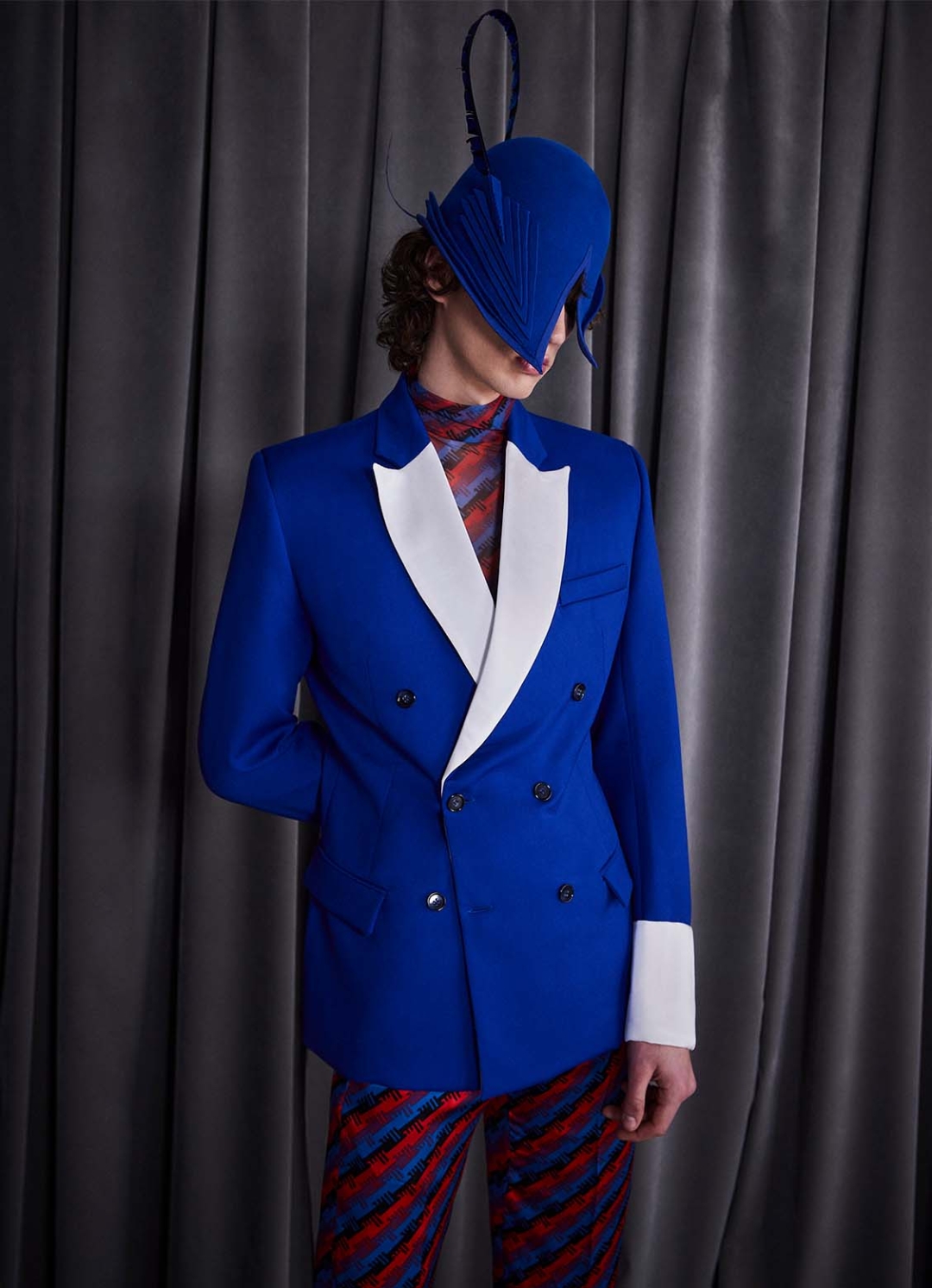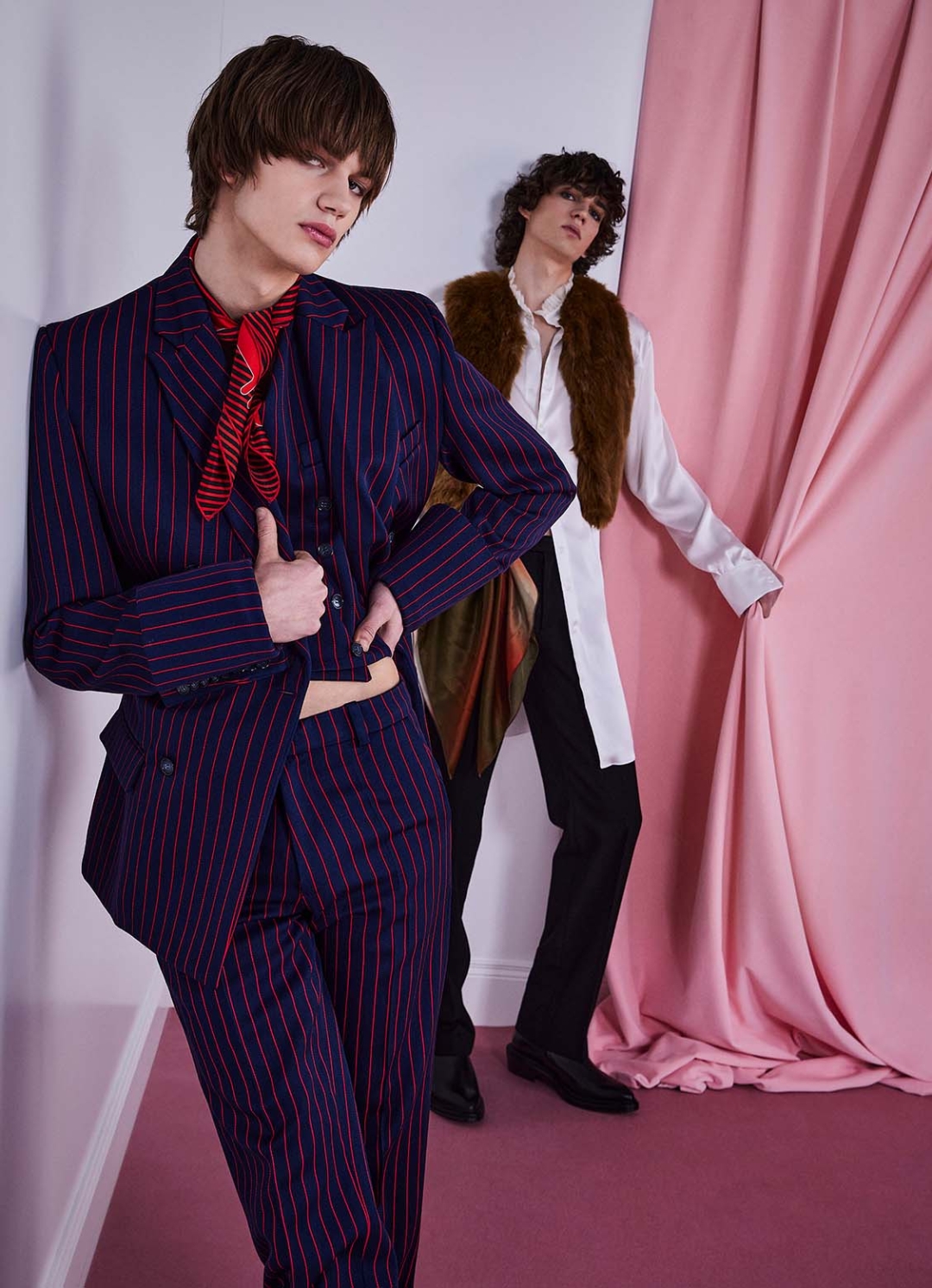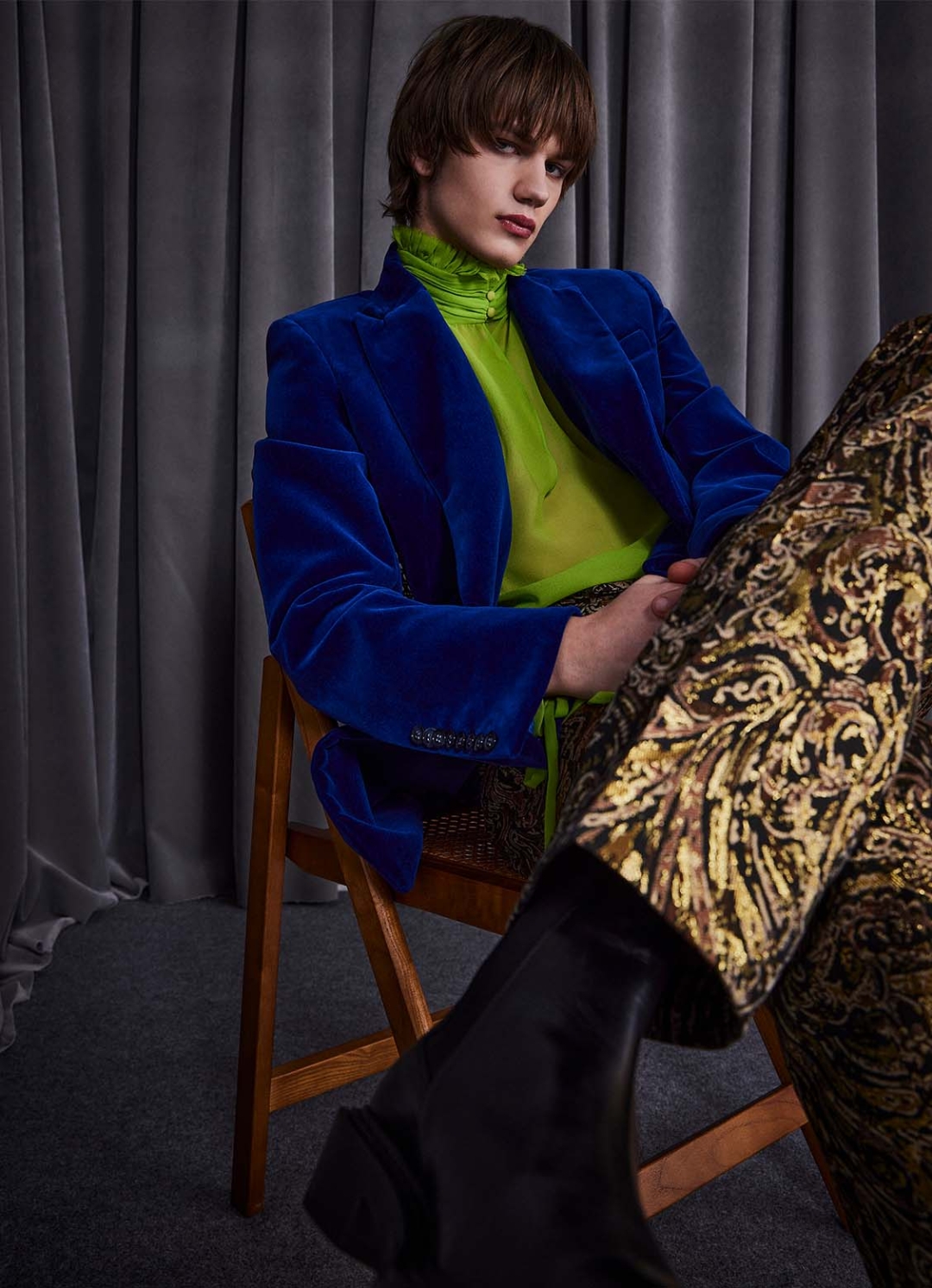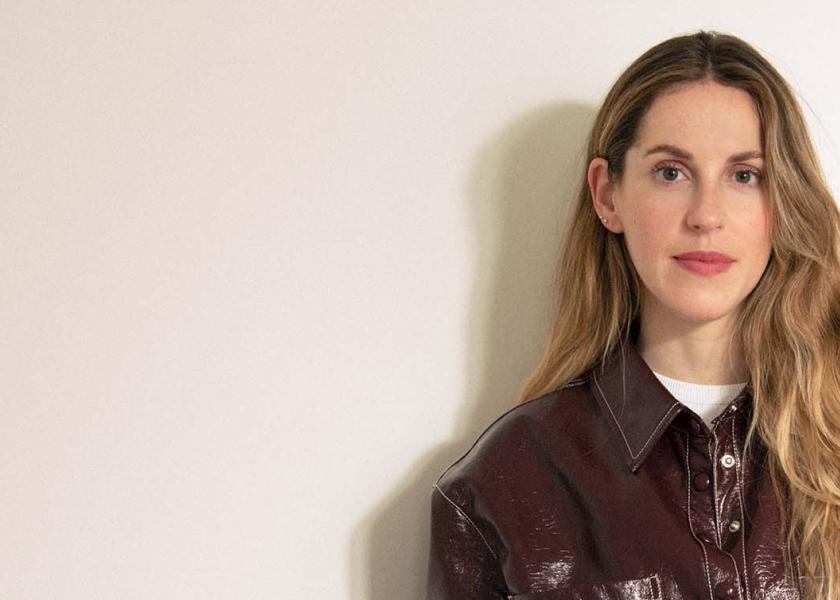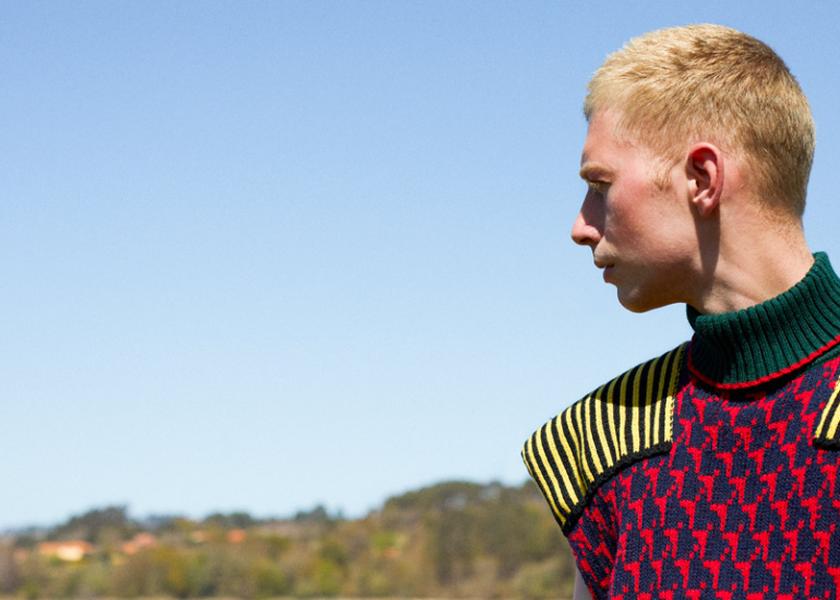Jaime Álvarez - Mans
Long live the tailor
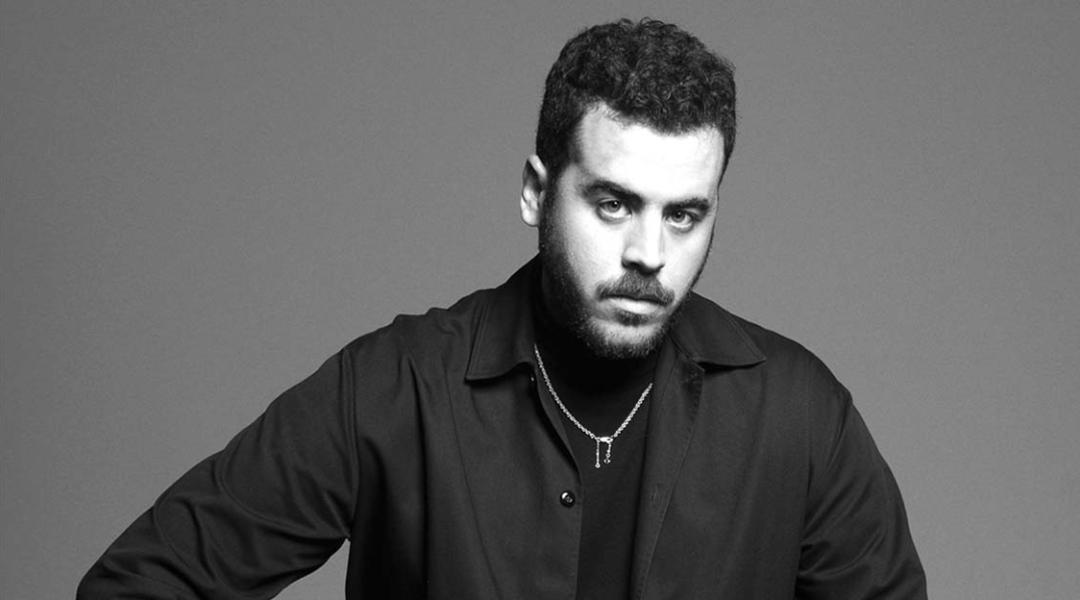
Jaime Álvarez, who found his place (and concept) in the middle ground between tradition and avant-garde, goes over tailoring codes from the perspective of a new masculinity. His impeccable designs are embellished with colourful bows, unbelievable prints, and are even caressed by (synthetic) silks and leathers. Because sustainability is only so if it goes with ethics, responsibility, and longevity.
Don’t let the devotion Jaime Álvarez (Sevilla, 1994) has for men’s tailoring fool you regarding the name of his brand. Mans has nothing to do with the term applied to men. It’s the surname of his grandfather on his mother’s side, from whom he inherited his sensibility for the trade and his taste for being well-dressed. His fashion is designed for men, but the way he recreates dressmaking has turned into a phenomenon that all genders have fallen in love with.
Jaime is aware that for a suit to sit well, you need to be an expert in pattern design. But as well as his prowess cutting and assembling fabrics, what has made this Sevillian creator an authority on new tailoring is his ability to decontextualise it. An unprecedented palette, prominent prints, and a flowing spirit have elevated his designs to avant-garde icons for the contemporary man.
What made you choose tailoring?
My grandfather on my mother’s side, whose surname is Mans and lends his name to the brand, was one of the few men in Seville who wore tailored suits at the time. He was the one who taught me from a young age to value tailoring and the work that a well-made garment entails. Unconsciously, he conveyed that love for this kind of dressmaking to me. Although I started studying women’s fashion, in my second or third year I felt that I couldn’t find a unique concept, a space where I could blend avant-garde and tradition, so I decided to go for tailoring. At that time there was a huge void between more classic and more modern men’s fashion, and I identified with that space. The brand came about as a personal need.
Do you believe designing tailoring requires a special talent?
This work requires a lot of patience because you have to be extremely meticulous. 90% depends on the cut; if a fabric isn’t cut well, even if it’s of the highest quality, the result won’t be good. I believe tailors are from another world, it’s plain to see that there aren’t many left, because it’s a very special trade and requires a lot of expertise.
“Tailors are from another world, it’s plain to see that there aren’t many left, because it’s a very special trade and requires a lot of expertise”
Today there are several designers like you who make fashion through tailoring. What’s made people want to wear suits again?
After the boom in sportswear and the pandemic, men want to be well-dressed again, feeling special through their clothes. It’s a tribute to good work. In the case of Mans, it’s not simply about going to a shop and choosing a garment; it also involves choosing a fabric, trying it on, and feeling special in a tailor-made suit.
There’s a lot of talk about how your garments transcend gender, what is it about your suits that women love so much?
Men inspire me to create my garments, but they're not exclusively designed for them. In fact, 85% of my sales are to women; it’s interesting. My clothes are genderless, it’s the person wearing them who has a gender.
What garment is your favourite to make or wear?
Without a doubt, the process of creating a blazer, because it’s both thrilling and tough. It’s a completely handmade, arduous job that is always undervalued.
Mans is a brand with an international spirit, but which are its ties to Spain?
All productions are made in Madrid. Years ago, I produced in my area, Seville, but since last year we try to make everything at our in-house studio. In any case, my country is present in all my collections. Although it may not seem like it, I try to include nods to Seville, Andalucia, and Spain in my designs through colours, shapes, prints...
One could think that tailoring is more creatively restrictive than other kinds of fashion. How have you managed to revolutionise this trade?
On the contrary, tailoring offers a lot of creative freedom. You can always go one step further, give it a twist through details, lapels, cuffs... There’s a completely new world waiting to be discovered.
What inspires your collections?
The range of inspiration I apply to my collections is extremely wide. My last collection was inspired by French art deco, that cabaret decadence from the 1920s and 1930s in Paris, that luxury using leathers —all synthetic—, that effeminate man who wore make-up and feathers. Last summer, it was Slim Aarons and his photographs of the high American society of the 1960s and 1970s. I’m greatly inspired by bygone fashion eras and artistic movements with a strong aesthetic, transforming them and aligning them with my view of tailoring.
“Tailoring offers a lot of creative freedom; you can always go one step further”
You need talent to make a well-fitting tailored suit, but what else?
There are many ingredients, from a good pattern to good fabric and, above all, a good cut. If a fabric isn’t well cut, even if it’s excellent, whatever you do, the result will be terrible.
There’s a lot of talk about sustainability, which is its role within your brand?
For us, it goes beyond using recycled fabrics and natural dyes. We use the best quality fabrics, such as 100% wool for blazers or merino wool for sweaters, and natural silks, but above all is an impeccable and responsible manufacturing process. For us, true sustainability consists of all those ingredients together helping to make a garment that will last in your wardrobe for more than 30 years, thus avoiding mindless shopping. What’s the point of using certain materials and methods if a garment ends up in landfill within two months?
Has this ethical vision led to you always using synthetic leathers?
Yes, we use synthetic leathers, but only if the manufacturing process is sustainable. That is, if the methods they’ve been manufactured with are not ethical, are made using cheap labour, or bad dyes, they’re no use. That’s not sustainable. We support a vision of tailoring based on using high quality materials and fair-trade labour.
